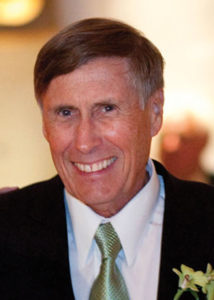
Walter Burdick
Class of January 1955
INDUCTED 2017
After high school, Walter earned a BA from Elmhurst College and was drafted into the Army’s Counter Intelligence Corps in Germany. Dr. Burdick obtained a Ph.D. in History and began teaching as a professor at Elmhurst College in 1968, where he spent 43 years. He served as Chair of the History Dept., Social Science Division and Academic Council and was subsequently named Professor Emeritus. Dr. Burdick provided services to the community by lecturing for local libraries and in teacher education conferences. He has also appeared on WTTW as a guest expert on matters of contemporary interest.
We were informed that Walter passed away 3/22/17 at the age of 80
Survivors include one sister, Joan Landi; his daughter, Tacy (Zach) Adair and his 2 grandchildren.
Dr. Walter E. Burdick, Jr. was a neighborhood kid who attended the Norman Bridge School and, after graduation in 1951, became an excellent student at Steinmetz High School—from which he graduated in January 1955. He then pursued further education which led to a long and distinguished career in higher education. Remarkably, he spent his entire career serving Elmhurst College, in Elmhurst, Illinois, as a highly-regarded Professor of History.
After graduation from Steinmetz, Dr. Burdick spent the better part of the several years in pursuing higher education– first earning a Bachelor of Arts degree from Elmhurst College in 1960. Shortly after graduation, like many young men in that era, he was drafted into the U.S. Army. While at Elmhurst College, Dr. Burdick took two years of German language classes to meet a graduation requirement there. His new military superiors took note of his language skills and then assigned him to the Army’s Counter Intelligence Corps and sent him to Germany—during the height of the “Cold War” with Russia and while Berlin was a “hot spot.” While in Germany, his duties involved a number of covert operations.
At the close of his army days, Dr. Burdick decided to follow up on his interest in becoming a history teacher. For that reason, he entered Southern Illinois University and, in 1964, he was awarded a Master of Arts degree. Immediately thereafter, he went on to begin a doctoral program at the University of Iowa. After finding the program there not entirely to his satisfaction, he was admitted to the Ph. D. program in the Department of History at Northern Illinois University. He was formally granted the Ph.D. degree in 1969. He also became a Certified Teacher in Secondary Education, just in case a college or university teaching job did not come his way.
While working on his doctorate at NIU, Dr. Burdick served as a teaching assistant, and then as a lecturer in NIU’s History Department. During this period, he also taught history on a part-time basis at William Rainey Harper College in Palatine. After completing all of the requirements for his doctorate at NIU, Dr. Burdick applied for the position of an assistant professor of history at Elmhurst College. He began teaching at Elmhurst in fall 1968. At that time, he had no idea that he would spend his entire career at Elmhurst before retiring in August 2011. By then, he had provided forty-three years of service to the college and was granted “Professor Emeritus” status.
It didn’t take long after his arrival before Dr. Burdick began to distinguish himself on Elmhurst’s campus as an interesting, well-informed, and caring professor. He was named as “Outstanding Faculty Member” there in 1973. He never slacked off in his commitment to the college and its students and was, for this reason, recognized as “Teacher of the Year” thirty years later in 2003.
In addition to teaching at Elmhurst College, Dr. Burdick played a significant role in expanding and improving the history curriculum. Over the years, he continued to inform his viewpoints about the subjects he taught through extensive reading, formal research, and extensive foreign travel. He became particularly well-known for his views on how the factors leading up to the Viet Nam War, its execution, and its aftermath had an impact upon our society and our modern history.
In addition to leadership in curriculum and program development, Dr. Burdick exhibited leadership in other important ways during his time at Elmhurst. Examples include his service as Chair of the History Department, Chair of the Social Science Division, Chair of the Academic Council, and Member of the Teacher Education Committee. Additionally, he served as President of the CCIU, a consortium of which Elmhurst College is a part.
Like most academics, Dr. Burdick was active in the professional associations and organizations relevant to historians and frequently made professional presentations in this context. Additionally, he was frequently called upon to review new books coming out in the field of history, and is the author of a number of professional publications.
Beyond the campus walls, Dr. Burdick provided services to the community at-large by lecturing for local libraries, in teacher education conferences and in similar settings. These experiences, when coupled with his several appearances on WTTW in Chicago as a guest “expert” on matters of contemporary interest, have given him local and regional prominence.
Dr. Burdick has had a life-long devotion to nature and the outdoors. He is a devotee of physical fitness and eating healthy food. He puts down the books often so that he can enjoy a fitness regimen that includes running, skiing, and playing tennis. For much of his life, he has lived on acreage in a rural farming area on the far reaches of the Chicago Metropolitan area and, perhaps for this reason, he is a strong advocate for many positions of the so-called Green Movement. He has often expressed grave concerns about both “climate change” and the potential over-population of the world—fearing the potential consequences of these troublesome developments.
Dr. Burdick has striven to retain his ties that came from his Steinmetz years by keeping up with many classmates and attending most of the class reunions that have been held over the years.
Special Thanks to Dr. Charles F. Falk for the insightful bio
